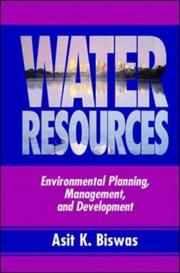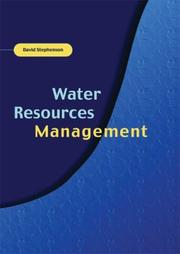| Listing 1 - 10 of 67 | << page >> |
Sort by
|
Book
ISBN: 953512045X 9535151452 Year: 2015 Publisher: IntechOpen
Abstract | Keywords | Export | Availability | Bookmark
 Loading...
Loading...Choose an application
- Reference Manager
- EndNote
- RefWorks (Direct export to RefWorks)
In today's rapidly changing business environment, strong influence of globalization and information technologies drives practitioners and researchers of modern supply chain management, who are interested in applying different contemporary management paradigms and approaches, to supply chain process. This book intends to provide a guide to researchers, graduate students and practitioners by incorporating every aspect of management paradigms into overall supply chain functions such as procurement, warehousing, manufacturing, transportation and disposal. More specifically, this book aims to present recent approaches and ideas including experiences and applications in the field of supply chains, which may give a reference point and useful information for new research and to those allied, affiliated with and peripheral to the field of supply chains and its management.
Logistics --- Management. --- Military art and science --- Purchasing & supply management
Book
ISBN: 953512434X 9535151495 9535124331 Year: 2016 Publisher: IntechOpen
Abstract | Keywords | Export | Availability | Bookmark
 Loading...
Loading...Choose an application
- Reference Manager
- EndNote
- RefWorks (Direct export to RefWorks)
The book is a collection of studies dedicated to different perspectives of three dimensions or pillars of the sustainability of supply chain and supply chain management - economic, environmental, and social - and other aspects related to performance evaluation, optimization, and modelling of and for sustainable supply chain management, and thus presents another valuable contribution to sustainable development and sustainable way of life.
Sustainability. --- Sustainability science --- Human ecology --- Social ecology --- Purchasing & supply management
Book
ISBN: 9780190864088 Year: 2020 Publisher: Oxford, UK : Oxford University Press,
Abstract | Keywords | Export | Availability | Bookmark
 Loading...
Loading...Choose an application
- Reference Manager
- EndNote
- RefWorks (Direct export to RefWorks)
This book applies cutting-edge thinking to identify pathways that can transform complex water conflicts. It challenges existing, deeply-held, and recurring power-blind and politics-lite analysis that suggests causal links between scarcity and violence, or peace. The book presents a much needed revision of transboundary water analysis, leading to a reimagination of the way water is used and contested, with a focus on harm experienced both by the most vulnerable water users and the environment. The authors' 'transformative analysis' provides multi-disciplinary tools and perspectives to understand and address the challenge. The approach is stress-tested through dozens of examples around the globe, and it incorporates collective evidence and knowledge of the London Water Research Group.
Book
ISBN: 0065000587 Year: 1993 Publisher: New York, NY : HarperCollins Publishers,
Abstract | Keywords | Export | Availability | Bookmark
 Loading...
Loading...Choose an application
- Reference Manager
- EndNote
- RefWorks (Direct export to RefWorks)
Water-supply --- Management --- Water --- Purification --- Sewage --- Water-supply - Management. --- Water - Purification. --- Sewage - Purification.

ISBN: 0070054835 9780070054837 Year: 1997
Abstract | Keywords | Export | Availability | Bookmark
 Loading...
Loading...Choose an application
- Reference Manager
- EndNote
- RefWorks (Direct export to RefWorks)
Water quality management --- Water-supply --- Management --- Water quality management. --- Management. --- Water-supply - Management
Book
ISBN: 9264179828 926417981X Year: 2012 Publisher: Paris : OECD Publishing,
Abstract | Keywords | Export | Availability | Bookmark
 Loading...
Loading...Choose an application
- Reference Manager
- EndNote
- RefWorks (Direct export to RefWorks)
A lack of finance for water resources management is a primary concern for most OECD countries. This is exacerbated in the current fiscal environment of tight budgets and strong fiscal consolidation, as public funding provides the lion’s share of financial resources for water management. The report provides a framework for policy discussions around financing water resources management that are taking place at local, basin, national, or transboundary levels. The report goes beyond the traditional focus on financing water supply and sanitation to examine the full range of water management tasks that governments have to fulfill; when appropriate, a distinction is made on distinctive water issues. The report identifies four principles (Polluter Pays, Beneficiary Pays, Equity, Policy Coherence), which have to be combined. In addition, it identifies five empirical issues, which have to be addressed on a case-by-case basis. Finally, it sketches a staged approach that governments might wish to consider, to assess the financial status of their water policies and to design robust financial strategies for water management. Case studies provide illustrations of selected instruments and how they can be used to finance water resources management.
Book
ISBN: 9535150995 9533072946 Year: 2011 Publisher: IntechOpen
Abstract | Keywords | Export | Availability | Bookmark
 Loading...
Loading...Choose an application
- Reference Manager
- EndNote
- RefWorks (Direct export to RefWorks)
Challenges faced by supply chains appear to be growing exponentially under the demands of increasingly complex business environments confronting the decision makers. The world we live in now operates under interconnected economies that put extra pressure on supply chains to fulfil ever-demanding customer preferences. Relative attractiveness of manufacturing as well as consumption locations changes very rapidly, which in consequence alters the economies of large scale production. Coupled with the recent economic swings, supply chains in every country are obliged to survive with substantially squeezed margins. In this book, we tried to compile a selection of papers focusing on a wide range of problems in the supply chain domain. Each chapter offers important insights into understanding these problems as well as approaches to attaining effective solutions.
Business logistics. --- Supply chain management --- Industrial management --- Logistics --- Purchasing & supply management

ISBN: 9058095738 9789058095732 Year: 2003 Publisher: Lisse: Balkema,
Abstract | Keywords | Export | Availability | Bookmark
 Loading...
Loading...Choose an application
- Reference Manager
- EndNote
- RefWorks (Direct export to RefWorks)
Water-supply --- Water resources development. --- Management. --- Water resources development --- Management --- Water-supply - Management
Book
Year: 2018 Publisher: Frankfurt a.M. PH02
Abstract | Keywords | Export | Availability | Bookmark
 Loading...
Loading...Choose an application
- Reference Manager
- EndNote
- RefWorks (Direct export to RefWorks)
In der ökonomischen Theorie natürlicher Ressourcen erfolgt die Analyse der intertemporalen Allokation hauptsächlich unter vollkommener Information. Gibt man die Annahme eines vollständigen Marktsystems auf, Zukunfts- und Risikomärkte seien nicht vorhanden, dann fallen bestimmte Allokationsmechanismen aus und rufen bei den Wirtschaftssubjekten Reaktionen hervor, die für sie entstandenen Informationsmängel und Risiken zu reduzieren oder gar zu beseitigen. Dies kann geschehen, indem die Wirtschaftssubjekte die fehlenden Märkte durch geeignete Institutionen ersetzen. In dieser Arbeit erfolgt die Betrachtung solcher Institutionen. Es werden die intertemporalen Allokationswirkungen von langfristigen Lieferverträgen, von Terminkontrakten, von Optionskontrakten, von Konzessionen, von Verträgen zur Abbaumengenteilung und von Dienstleistungsverträgen analysiert.
Environmental economics --- Purchasing & supply management --- Allokation --- erschöpfbarer --- fehlenden --- Helmut --- institutionalisierten --- intertemporale --- Marktsubstituten --- Meder --- Zukunftsmärkten
Book
ISBN: 3540530975 0387530975 Year: 1991 Publisher: Berlin New York Springer Verlag
Abstract | Keywords | Export | Availability | Bookmark
 Loading...
Loading...Choose an application
- Reference Manager
- EndNote
- RefWorks (Direct export to RefWorks)
| Listing 1 - 10 of 67 | << page >> |
Sort by
|

 Search
Search Feedback
Feedback About UniCat
About UniCat  Help
Help News
News